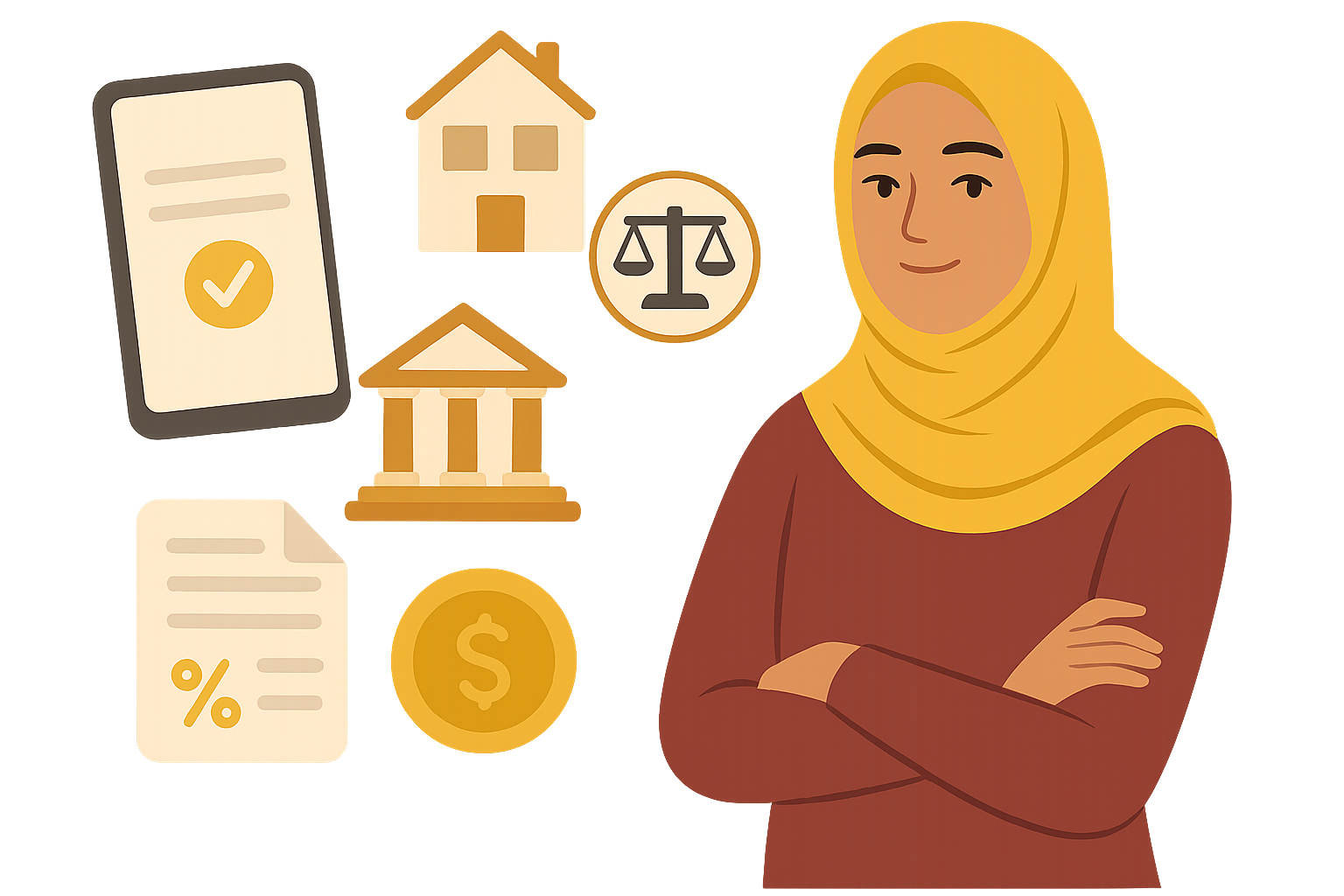Inheritance Law Islam
- Go Lawyers
Inheritance Law Islam – Honouring Faith, Securing Legacy
Empowering Your Legacy with Faithful Precision
Navigating inheritance law Islam isn’t just about legal frameworks—it’s about honouring centuries of divine guidance. Our firm specialises in ensuring your estate is distributed justly, compassionately, and exactly as Islamic law intends. If you’re seeking clarity and confidence in how your legacy will be handled, you’ve come to the right place.
Islam and inheritance is a sacred contract that ensures wealth is allocated according to divine will. By following Islamic inheritance law, you protect your family, preserve fairness, and ensure your wishes align with Allah’s commands. At our core, we understand that Islamic inheritance is more than a legal issue—it’s a spiritual responsibility.
GUIDING YOU THROUGH ISLAMIC INHERITANCE LAW WITH CLARITY
We provide expert guidance on Islamic inheritance, helping you navigate the complexity of Qur’anic shares, heir rights, and Shariah compliance with confidence and ease.
Our personalised estate planning ensures your assets are distributed according to Islamic law on inheritance, preserving both your wealth and your family’s unity in accordance with divine law.
Book your Inheritance Law Islam consultation today
We’re here to help you with all your legal needs. Our team is ready to assist if you have a question, need advice, or want to schedule a consultation.

- What We Solve
Your Guide to Fair and Faithful Islamic Inheritance Planning
An effective Islamic inheritance plan ensures your wealth is distributed in strict accordance with divine law, maintaining fairness, unity, and religious compliance. Whether preparing your will, allocating shares, or clarifying complex family situations, we ensure your legacy honors Islam and inheritance principles.
Inheritance law Islam is not just about dividing assets — it’s about protecting rights ordained by Allah. We help you navigate obligations, prevent family disputes, and ensure rightful heirs receive their share under Islamic inheritance law. From understanding Qur’anic shares to dealing with civil law differences, we simplify the complex so you can plan with confidence.
Qur’anic Principles
At the heart of Islamic inheritance law lies a divine system outlined in the Qur’an, particularly in Surah An-Nisa (Chapter 4:11–14). These verses establish fixed portions that must be followed precisely, leaving no room for arbitrary decisions. This is a clear command from Allah, intended to prevent injustice, favor, or omission in wealth distribution. Obligatory shares are predetermined for key family members, including parents, spouses, and children, making this system not only equitable but spiritually binding.
Heirs in Islamic Law
Under Islamic inheritance, heirs are classified into two groups: primary and secondary. Primary heirs, such as parents, spouses, and children, are guaranteed fixed shares under Islamic law on inheritance. Secondary heirs—like siblings, grandparents, and uncles—may inherit depending on the presence or absence of primary heirs. A unique aspect of inheritance law Islam is that the presence of certain heirs can exclude others entirely, meaning eligibility can shift based on family structure. Understanding this ensures no rights are mistakenly ignored.
Fiqh (Islamic Jurisprudence) Schools
The implementation of Islam and inheritance law is influenced by various schools of Islamic jurisprudence. In Sunni traditions—Hanafi, Maliki, Shafi’i, and Hanbali—the principles remain consistent but differ slightly in interpretation. In contrast, the Shia Ja’fari school applies a different approach to both heir eligibility and share allocation. Where ambiguity arises, scholars rely on consensus (Ijma), a traditional Islamic legal tool that ensures rulings are based on established knowledge and scholarly agreement.
Gender and Inheritance
One of the most discussed elements of Islamic inheritance law is the gender-based allocation. Typically, a male heir receives twice the share of a female in the same category. This rule is based on the Islamic framework where men bear greater financial responsibility. While the rationale is rooted in justice and provision, modern conversations increasingly explore how Islam and inheritance can evolve in diverse economic settings. We help you understand both traditional expectations and contemporary interpretations.
Wasiyyah (Will/Testament)
The concept of a will, or wasiyyah, allows a Muslim to bequeath up to one-third of their estate to non-heirs or for charitable causes. However, this portion cannot infringe upon the obligatory shares mandated in the Qur’an. Writing a will is both an ethical duty and a legal tool, providing clarity, avoiding family conflict, and ensuring your values are honored after death. Through a carefully prepared wasiyyah, Islamic inheritance becomes more than a legal formality—it becomes a legacy.
Estate Distribution Process
Before any inheritance is distributed, Islamic law requires that all debts of the deceased are settled, and funeral expenses are paid in full. Only then can the remaining estate be divided. The appointed executor plays a critical role in managing this process, ensuring the correct implementation of inheritance law Islam. This role demands precision, understanding of both civil and religious law, and a strong sense of duty to the deceased and their heirs.
Modern Applications and Legal Systems
Implementing Islamic inheritance in today’s global context means understanding how religious obligations intersect with secular legal systems. While some countries like Saudi Arabia and Egypt have codified Islamic law on inheritance, many Muslims living in non-Muslim-majority nations must reconcile Shariah law with civil law.
Common challenges include joint property, inheritance tax, and courts that may not recognise Qur’anic shares. We help you bridge this gap with compliant, legally sound solutions.

- let’s navigate your path forward together.
Explore Our Expertise
The future of your business or family legacy starts with an effective succession plan. At Go Lawyers, we specialise in identifying and developing talent, securing potential successors, and ensuring businesses thrive. Contact us today to begin crafting a structured succession plan that safeguards your future and ensures success for generations to come.
- Professional Services
The Importance of Islamic Inheritance Planning
A well-structured Islamic inheritance plan is essential for Muslim families who wish to protect their wealth, uphold Shariah principles, and avoid disputes among heirs. When handled properly, inheritance law Islam ensures your legacy is honored both spiritually and legally. Here’s why Islamic estate planning truly matters:
Ensures distribution follows Qur’anic law and avoids unjust claims.
Prevents family disputes by clearly defining each heir’s rightful share.
Supports long-term financial protection for spouses, children, and parents.
Bridges the gap between religious obligations and local legal requirements.
Islamic inheritance law ensures your estate is distributed in accordance with Allah’s guidance, helping you preserve family harmony, protect vulnerable heirs, and secure barakah (blessing) in your legacy.

- FAQs
Frequently Asked Questions.
Got questions about Islamic inheritance? Explore our FAQs for clear, Shariah-compliant answers to help you plan with confidence.
Islamic inheritance is divinely mandated with fixed shares detailed in the Qur’an, while civil laws are typically flexible and may depend on personal choice or court rulings. This makes compliance essential for Muslims who want to follow Allah’s command.
Under Islamic law on inheritance, heirs with fixed shares cannot be excluded. However, the wasiyyah allows you to allocate up to one-third of your estate to non-heirs or causes of your choice.
Yes. Our service bridges Islamic inheritance law with local legal requirements, helping you document your will in a way that is both religiously valid and legally enforceable.
In most cases, male heirs receive double the share of female heirs in the same relationship tier. This rule supports the Islamic financial model where men carry greater fiscal responsibility.
The estate is still divided according to inheritance law Islam rules, with shares distributed to eligible heirs as per Qur’anic instruction.
Yes. You must appoint a trustworthy executor who understands both Shariah and local laws to carry out your wishes and settle your estate.
No. Debts must be paid before any inheritance is distributed. It’s a serious responsibility and a key part of the estate process.
Surah An-Nisa (4:11–14) is the main source of detailed inheritance law in the Qur’an, outlining specific shares and the spiritual obligation to follow them.
Adopted children do not automatically inherit under Islamic inheritance law, but they can be included through the wasiyyah portion.
By working with a legal expert in Islam and inheritance, you can draft a compliant will that fulfills Qur’anic obligations, meets local laws, and protects your loved ones.
- Expert Mediation Services
Find Resolution, Not Conflict
Disputes don’t have to lead to lengthy court battles. At Go Lawyers, our mediation lawyer services provide a practical and efficient way to resolve conflicts. Our experienced team fosters constructive dialogue to achieve fair and mutually beneficial outcomes, whether it's family mediation, business disputes, or transactional issues.
Let us guide you toward a solution that prioritises your interests while preserving relationships.
- Why Choose Go Lawyers?
Professional Lawyers who offer a fixed, fair price
Whether you are an individual, a business owner, or part of a giant corporation, our experienced team delivers solutions that protect your interests and drive results. From drafting contracts and negotiating agreements to resolving disputes through mediation or litigation, we handle every aspect of your legal needs professionally and carefully.
We understand the importance of clear communication and cost-effective services, so we prioritise transparency and efficiency. Our team possesses expertise in risk management, compliance, and the resolution of commercial disputes, allowing you to depend on us as a reliable partner throughout the entire process.
